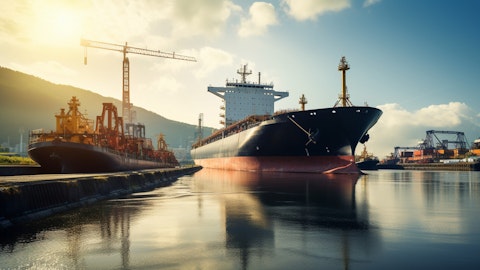Ryan Oviatt: Yes. Good question. And it’s something that we continue to bounce around. It changes. If you’d ask that question three years ago, I would have said we’d be done by now, but supply chain obviously had a huge impact on us. So right now, we’re thinking that it’s kind of towards the end of this year, early 2025 as to when we will look to fully have that transitioned and to not be selling the 2100 past that point. But again, supply chain issues may impact that. That’s our desire at this point, but we’ll continue to deal with customers and support customers and work with our supply chain in whatever way we need to, to make this be the right decision for both Profire and our customer base.
Cameron Tidball: I’ll add to that before we jump into some commentary on international. We plan to support our customers with parts for the 2100 because, obviously, if you just shut off the tap and they can’t support the product after that wouldn’t go over well, but we think we have a strategy in place that we’ll resonate with customers for their ability to keep things going, but also to a point where it will come a time where you’ve got to upgrade to one of our newer systems. So overall, we think the plan is going well. Like Ryan said, we would have hoped to have transitioned a couple of years ago, but it’s just the way it goes with the supply chain, but we’re grateful that we have ample supply now of both products, which is great.
In terms of international, we’ve definitely seen an uptick to start the year. Most of it coming from South America, Latin America, particularly Argentina, with a new President there, kind of shaping things a little bit differently. We believe that it has had a positive impact on those who invest in E&P production there, and we’ve seen some resulting orders. If you look at overall, international now is approximately 46% of all rigs are outside of the United States and Canada. That’s higher than last year. A very high percentage of that overrepresented, of course, is the Middle East, which year-over-year, they’re up a few rigs, I believe, 15 rigs. A lot of that is in places like Qatar who are saying, you know what, we’re going to jump on this LNG track as quick as possible.
Overall, Profire still has our distribution channels in the international markets. We’re looking to strengthen them, particularly in places where we see great expansion for the future, such as India. So we’re looking for opportunities there of how that could best make sense to grow that. We are working on a lot of OEMs that send their products internationally. We’re getting more and more exposure with that, whereas before, sometimes we just sell to OEMs, and then we get a tech call or request for a spare part down the road and in go, “Oh, that would have gone international. We’re getting more and more requirements from international companies, more web forms coming on the website, same request for some support or spare parts. So we know that our international business is growing, but still not to a point where it’s worth to break out, we don’t think.
John Bair: Okay. Well, that’s interesting as well. So with your efforts to expand business outside of the oil and gas industry, are you getting any business that is not oil and gas related internationally? In other words, landfill gas, I don’t know to what extent that’s actually done internationally, but it would seem that would be a complementary business expansion opportunity.
Cameron Tidball: Yes, absolutely. So far, anything that is international that has to deal with nontraditional upstream business for Profire has really been in that critical energy infrastructure space. So bigger plants that deal with processing facilities, storage facilities. We’ve seen some of that in terms of some of the projects that we’re working that are like really greenfield for Profire, like we talked about coal processing or you name it, critical infrastructure surrounding like sand driers, asphalt drugs, fly ash. We haven’t seen any of that as of yet. We currently do not have a partner that we believe would support us outside of oil and gas in international space. It’s part of the road map. But for the foreseeable future in 2024, we’re more focused in the backyard where we can support those projects with our technical team and even service support because they are different from a process perspective, they’re not as plug-and-play as upstream oil and gas.
So it’s in our future, John. But right now, the focus for non-oil and gas ventures is definitely in North America.
John Bair: Okay. Great. Thanks very much for taking the questions. I hope to see you soon.
Cameron Tidball: Thanks John.
Operator: There are no further questions in the queue. I would like to hand the call back over to management for closing remarks.


